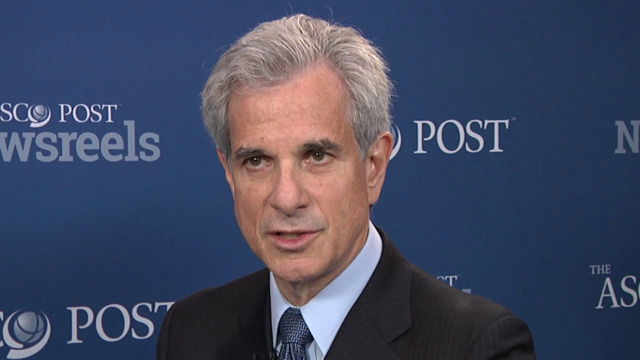Howard M. Sandler, MD, and Christopher Sweeney, MBBS, on Results of the RTOG 0521 Trial on Localized, High-Risk Prostate Cancer
2015 ASCO Annual Meeting
Christopher Sweeney, MBBS, of Dana-Farber Cancer Institute, and Howard M. Sandler, MD, of Cedars-Sinai Medical Center, discuss the improvement of overall survival with the use of adjuvant chemotherapy following androgen suppression and radiotherapy (Abstract LBA5002).
Howard I. Scher, MD
Howard I. Scher, MD, of Memorial Sloan Kettering Cancer Center, discusses the updated criteria that will guide clinical trial design and conduct for therapeutics being tested in castration-resistant prostate cancer (Abstract 5000).
Sagar Lonial, MD, and James O. Armitage, MD
James O. Armitage, MD, of the University of Nebraska Medical Center, and Sagar Lonial, MD, of Emory University School of Medicine, discuss results from two important studies that tested lenalidomide/dexamethasone with or without elotuzumab and daratumumab monotherapy (Abstracts 8508 and LBA8512).
James H. Doroshow, MD
James H. Doroshow, MD, of the National Cancer Institute, describes a new precision medicine initiative called the MATCH trial: Molecular Analysis for Therapy Choice. In 2,400 NCI clinical trial sites, 3,000 patients will be screened and their tumors analyzed to determine whether they contain genetic abnormalities for which a targeted drug exists.
Christian Carrie, MD and Celestia S. Higano, MD
Christian Carrie, MD, of Centre Léon Bérard, and Celestia S. Higano, MD, of the University of Washington, discuss short hormonal therapy and radiotherapy as salvage treatment for relapse after radical prostatectomy (Abstract 5006).
Derek Raghavan, MD, PhD
Derek Raghavan, MD, PhD, of the Levine Cancer Institute, gives his insights into key genitourinary cancer clinical trials presented at the 2015 ASCO Annual Meeting and his thoughts on where the research is headed.





